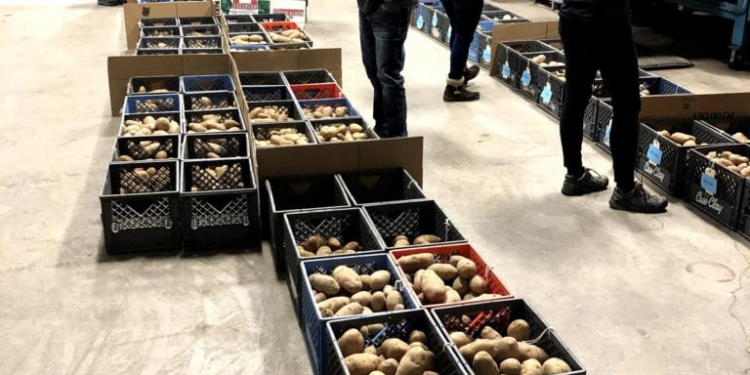Covid-19 has changed the way business is done across the globe, and it is no different when it comes to agricultural research. In a previous post, we highlighted how Medius.Re can help facilitate remote collaboration specifically in relation to variety development efforts. This week, Medius is making it happen in the North American potato industry by linking growers, breeders, and processors for an annual field day to evaluate emerging potatoes for frozen processing.

The National Fry Processors Trial (NFPT) annually evaluates up to 70 varieties and compares them to the industry standards of Russet Burbank and Ranger Russet. This year, 314 variety samples representing 48 new clones and industry standards from six U.S. growing locations–Idaho, Maine, North Dakota, Oregon, Washington, and Wisconsin–are being evaluated in the NFPT program. In its 10th year, the NFPT is a collaboration between state potato grower organizations, processors, and breeders from across the country. The program is managed by Potatoes USA, the U.S. potato check-off organization based in Denver, Colorado.
Since 2016 when Medius began partnering with Potatoes USA to manage the trial data generated in the NFPT program, significant strides have been made to bring the sample evaluations online from a paper format. Although we could have never known that the pandemic would make business as usual impossible this year, the work done in prior years has prepared us to seamlessly facilitate 100% remote participation in the 2020 NFPT Field Day.
In previous years, NFPT Field Day attendees traveled to the USDA Agricultural Research Service Potato Research Worksite (PRW) in East Grand Forks, Minnesota, in mid-October. There they would physically evaluate trial samples that had been shipped from each of the trial locations. Not only would critical characteristics like yield and specific gravity be considered, but also individual clonal attributes like length, width, depth, and general appearance would be considered to create a subjective measure that would inform future decisions on whether varieties should advance within the program or be discontinued. With many organizations and companies advising against travel, this in-person evaluation was not possible this year. When Potatoes USA staff asked Medius about conducting the 2020 NFPT Field Day in a wholly remote way, the answer was an unequivocal yes.
In 2020, samples were sent from each of the trial locations to the PRW as in previous years. But instead of hosting attendees, PRW staff took standardized photographs of each sample and those photos were uploaded to the NFPT portion of potatoesusa.medius.re. Registered NFPT Field Day participants were provided the data for each sample’s yield, dimensions, and specific gravity as well as access to the photos that correlated to each sample’s data. For each clone, there could be up to six samples–or one from each growing location. Each sample had its own set of data and corresponding photos. At his or her convenience, an individual participant could evaluate each sample, make notes, and then save their completed evaluations. Medius.Re also gave participants the flexibility to conduct a partial evaluation, save the work, and come back to it later. To preserve as much evaluation objectivity as possible, clone names were masked until all participant evaluations were completed. To help address any technical questions in the evaluation process, Medius founder Brad Halladay created a tutorial video to assist participants to navigate the evaluation interface. The video is available below.
We are pleased to have played a critical role in allowing the 2020 NFPT Field Day to continue in spite of the pandemic and believe that the further developments made to the .Re platform will enable more efficient and accurate variety development evaluations–both in-person and remote–for a wide array of agricultural commodities in the future. For more information or if we can help you facilitate your variety development evaluations, please reach out at info@mediusag.com.





